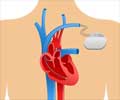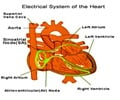Micra Transcatheter Pacing System is small enough to be delivered through a catheter and implanted directly into the heart to treat irregular heart beat.

- The Micra Transcatheter Pacing System (TPS), recently approved by the US Food and Drug Administration (FDA), is a newly designed pacemaker. //
- The pacemaker is one tenth the size of the traditional device and provides patients with the most advanced pacing technology.
- TPS is small enough to be delivered through a catheter and implanted directly into the heart, providing a safe alternative to conventional pacemakers.
Unlike traditional pacemakers, this one does not require cardiac wires (leads) or a surgical "pocket" under the skin to deliver a pacing therapy.
When the heart rate is low, it renders the heart incapable of pumping enough oxygen-rich blood to the body during normal activity or exercise, thereby causing dizziness, fatigue, shortness of breath or fainting spells.
"The device is small enough to be delivered through a catheter and implanted directly into the heart, providing a safe alternative to conventional pacemakers without the complications associated with leads," said Schurmann.
"The device also allows us to automatically adjust pacing therapy based on a patient's activity levels and another positive is the battery can last up to 10 years," he said.
"This is not a complicated procedure and the first patient that we implanted is doing extremely well," said Paul Schurmann, from Houston Methodist Hospital in the US.
Source-Medindia















